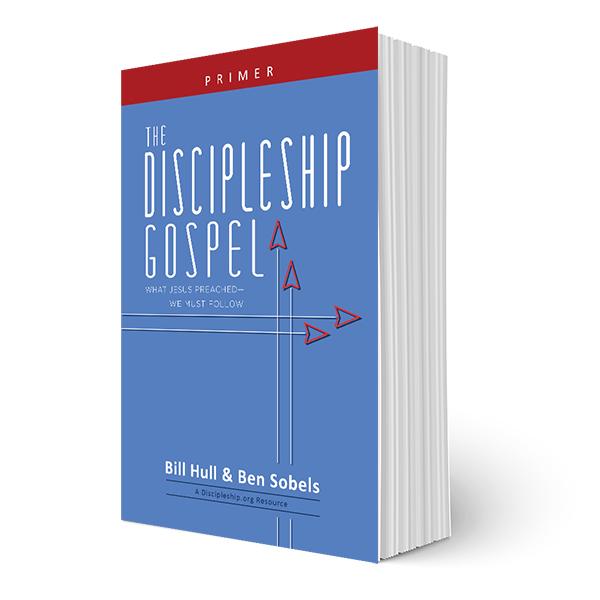Discipleship Isn’t Optional
This blog is an excerpt from the free eBook, The Discipleship Gospel Primer. Download it free here.
The contemporary church is quite human and behaves very much like Jesus’ fellow Nazarenes. The kingdom of God has had as much trouble getting underway in the contemporary church as it did when Jesus did great work in his hometown. The citizens of Nazareth couldn’t see past the boy Jesus to the messiah Jesus. They were so prejudiced against God showing any favor to any group other than them that they were ready to kill him. It’s a human tendency to take the blessings of the gospel—which should lead us to receiving Christ’s love and sharing it with others—and hoard them selfishly (even violently!) for ourselves. Doing this distorts the gospel from being others-focused to being self-focused.
The church’s greatest barrier today is her distortion of the gospel. This comes, in part, because of what we preach and what we leave out of our preaching. The most common gospel preached in the developed world—in places like the United States, Canada, Western Europe, parts of Africa and Asia, Australia, and New Zealand—is the forgiveness-only, consumer gospel. The problem with this gospel is that it’s only part of the truth.
Gospel Distortions
Those in the developing world, however, don’t quite have it down either. In our experience, the most common gospel in underdeveloped countries is the prosperity gospel, which makes discipleship almost impossible to teach as an essential part of the good news. This kind of gospel turns everyone into a consumer of religious goods and services.
This is from Bill Hull and Ben Sobel’s free eBook, The Discipleship Gospel Primer. Download the eBook here in your favorite format at no cost.
Neither version includes discipleship as a normative part of what it means to be saved. Both the forgiveness-only gospel and the prosperity gospel make no room for the ways and means that Jesus passed on to his followers. Neither has a serious connection to character transformation, and neither expects everyone who is “saved” to actually follow Jesus. Moreover, these “gospels” don’t set the precedent for making disciples who make disciples. The idea that every believer in Christ is a follower of Christ is not part of his or her theology, program, or curriculum.1 In other words, both of these gospels have a fatal flaw—they separate conversion from discipleship and make discipleship optional.
Through our work with The Bonhoeffer Project, we have made a lot of noise in speeches and in print about two important statements that are both vital to the message of this book:2
You can’t make a Christlike disciple from a non-discipleship gospel.
The gospel you preach determines the disciples you make.
These statements mean that even a very aggressive missional effort over the next fifty years that preaches the gospel to the ends of the earth—if it is the wrong gospel—would leave Jesus still waiting to return. Jesus said, “The Good News about the Kingdom will be preached throughout the whole world, so that all nations will hear it; and then the end will come.”3
A false gospel says, “Jesus died for your sins, he rose from the dead, he ascended into heaven, and he will return someday to gather his church. Everyone who has agreed with this set of religious facts is a Christian. By the way, you don’t need to do anything about it; in fact, you can’t do anything about it because it is all by grace.”
As the late theologian and author Dallas Willard once quipped, “We have not only been saved by grace, we have been paralyzed by it.”4 The church today is truly paralyzed, and it’s largely because of its view—even deification—of grace. As a whole, the church lacks commitment to making disciples through its ordinary members on a global scale. Making and multiplying disciples is not expected of us, so it has not been done. As long as someone preaches the wrong gospel, Jesus’ work won’t be completed, and only a small fraction of lives will be changed.
Non-discipleship gospels may be advanced through many powerful forms of media, but they won’t multiply through transformed lives of disciples who are making still more disciples. They can’t. The ways and means that Jesus prescribed have not changed: People with discipleship DNA are needed for reproduction and multiplication. They are a must, no substitutes. Converts as far as the eye can see will never accomplish what a few committed and multiplying disciples can do given enough time.
If we continue down the path we’re on, the world will be awash with nominal Christians who will be shaped by a gospel that doesn’t reproduce, doesn’t transform, and doesn’t represent the true gospel. False gospels will insulate and corrupt nations and those gospels will fail to accomplish God’s will.
When that gospel is preached to all nations, however, Jesus said the end would come: “The Good News about the Kingdom will be preached throughout the whole world, so that all nations will hear it; and then the end will come.” Disciples who make other disciples who in turn make still more disciples multiplied throughout the earth will preach this gospel. SØren Kierkegaard has a pertinent observation here: “The main difference between an apostle and a genius is that a genius does not speak with authority but has to rely on skill.”5
The spread of this gospel will come from ordinary people who have the authority of the gospel. These people will accomplish more than what the most innovative and technically savvy group of genius Christians without gospel authority could ever fathom. As we hold up the gospel that Jesus preached, we have power to penetrate every part of society and every corner of the earth. Let’s start today by truly understanding the gospel, then proclaiming it broadly into a world of lost souls who desperately need all that God has to offer, including the call to follow Jesus in obedience.
This blog is an excerpt from the free eBook, The Discipleship Gospel Primer. Download it free here.
NOTES
1. For a complete treatment of this subject see the Introduction and Chapter 1 of Conversion and Discipleship (Grand Rapids: Zondervan, 2016).
2. Bill is co-founder with Brandon Cook of The Bonhoeffer Project which is devoted to creating disciple making movements in local contexts. Ben helps Bill as they train ministry leaders toward this end.
3. Matthew 24:14.
4. A personal conversation Dallas Willard had with the author (Bill).
5. This is a summary of Kierkegaard’s thoughts in the words of Stephen Backhouse, Kierkegaard, A Single Life (Grand Rapids: Zondervan, 2016) 151.
Written by Bill Hull and Ben Sobels
BILL HULL is cofounder of The Bonhoeffer Project and author of Conversion and Discipleship and The Disciple-Making Pastor. He speaks as a persevering prophet on the topic of discipleship around the nation.
BEN SOBELS is a graduate of Dallas Theological Seminary and serves as Senior Pastor at Cypress Community Church in Salinas, California. He also serves as a regional director for The Bonhoeffer Project.





